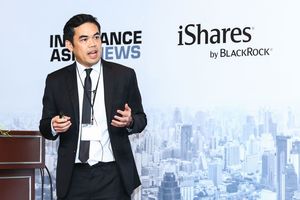The investment challenge facing Thai life insurers
November 18 2016 by Nick Ferguson
The outlook for asset managers trying to earn sufficient returns continues to be challenging given the heightened uncertainty they face these days. The causes are legion: the US presidential election, the guessing game around the Fed’s next rate hike, Brexit, negative rates in Europe and Japan, geopolitical tensions with Russia.
To help navigate some of these challenges, InsuranceAsia News and BlackRock hosted an event in Bangkok earlier this month. The Strategic Asset & Risk Forum for Thai Life Insurers brought together leading players in the local industry to meet and discuss the issues that they face — and to consider some of the solutions.
The challenges in Thailand are not only global. The country is also in a period of mourning after the death of its revered king, Bhumibol Adulyadej, in October. Insurers also face some regulatory uncertainty as new risk-based capital rules slowly edge towards implementation.
Against this backdrop, Pipat Luengnaruemitchai, head of private wealth research at Phatra, gave a speech discussing the overall market conditions facing Thai asset managers.
While it is true that some emerging markets still boast relatively strong fundamentals, Luengnaruemitchai warned that Thailand was possibly suffering from a “new normal” of lower economic growth, combined with a population that is the oldest in South-East Asia.
The country’s gross domestic product has been trending at below 3% since the global financial crisis, compared to an average of more than 5% for the previous decade and more than 7% during the years before the Asian financial crisis.

Demographics may be the cause of this decelerating growth, suggesting that it is a long-term and possibly irreversible trend. The median age in Thailand is 36.2, whereas every other country in the region has a median in the 20s.
“We will get old before we get rich,” said Luengnaruemitchai.
In emerging Asia, only China has an older population. Indeed, Thailand’s demographic outlook represents an extreme case even on a global scale. The country’s working-age population has already peaked and is set to shrink faster than any other country in the region during the rest of this century — even faster than Japan.
Clearly this outlook is a concern for life insurance portfolios that are predominantly invested in domestic markets, which was also discussed in a panel featuring Sukkawat Prasurtying, CIO at AIA in Thailand; Arj Seriniyom, Thai Life’s head of investments; and BlackRock’s Brent Kao.
The trio also talked about how the low interest-rate environment is affecting asset-liability management and the strategies Thai insurers are using to source additional yield to meet their return requirements.
Diversification into other assets and geographies clearly makes sense, but all three agreed that upcoming changes to the regulatory capital regime also need to be taken into consideration.
Capital requirements
On this subject, Sutee Mokkhavesa, senior executive vice-president for risk and strategy at Muang Thai Life Assurance, gave an overview of the progress towards the new rules during his keynote speech.
Thailand introduced a risk-based approach in 2011 and kicked off the RBC 2 project in 2013, eventually issuing a consultation paper in April this year and a quantitative impact study in July. Finalisation of the regime continues.

Although there is still considerable uncertainty about how exactly the rules will be implemented, and over what period, ultimately they should provide greater incentive for Thai insurers to look more closely at their investment strategies.
Exchange-traded funds are an increasingly important consideration for institutional investors such as asset managers and insurers worldwide, as several structural forces drive investors to shift their allocation to such products, said Aleksey Mironenko, head of the institutional ETF specialist team for iShares in Asia ex-Japan.
The principal drivers are the unbundling of alpha from exposures, a shift to fee-based advisory in developed markets and shrinking bank balance sheets. These forces have seen ETF assets grow at almost 19% a year for the past five years.
Investors should see ETFs as a technology that provides low-cost market exposure, said Mironenko. At the same time, they also offer transparency, liquidity and simplicity.
In a world of heightened uncertainty, in Thailand and globally, these qualities offer a valuable degree of flexibility for asset managers.
-
Cat’s well and truly out of the bag: Asia’s ILS market set for ‘active’ 2026
- February 26
Other jurisdictions may follow Hong Kong and Singapore in establishing their own ILS regimes after a record-breaking year for catastrophe bond issuance globally last year.
-
P&I clubs drop anchor on rate increases amid strong retentions
- February 25
Gard, West P&I, The Swedish Club, NorthStandard, and Skuld reflect on the 2026 protection and indemnity (P&I) renewals season.
-
The ultimate safety net: high risk confusion creating piracy cover concerns, CFC’s Alexander Beaton says
- February 24
Incidents reported on vessels rose from 117 in 2024 to 137 in the 12 months to December, with the Singapore Strait reporting the highest number at 80.
-
Asia’s cyber insurance market set for rapid growth after wake-up call, CyberCube says
- February 23
Recent attacks on the likes of Asahi and Coupang has highlighted the significant protection gap in the region, director of cyber risk consulting Jon Choi tells InsuranceAsia News.
-
QBE | Elevating customer experience, humanising claims: QBE Asia’s ‘Solutions in a Box’
Vastly improving turnaround times and personalising service delivery, QBE Asia’s award-winning, end-to-end bundled claims solutions is a game-changer for the insurance industry.
-
Beazley | What does cyber protection look like from day 1 to day 600 and beyond?
Cybersecurity is no longer just an IT concern, but a governance issue that belongs on the boardroom agenda.
-
Sedgwick | Preparing for the next storm
Insurance industry needs to recalibrate, invest in innovation and strengthen systems, talent and data practices.
-
Peak Re | From climate modelling to market opportunity: Forging a new clarity on Southeast Asia’s climate risk
Southeast Asia's protection gap: a crisis of clarity, not just capital

